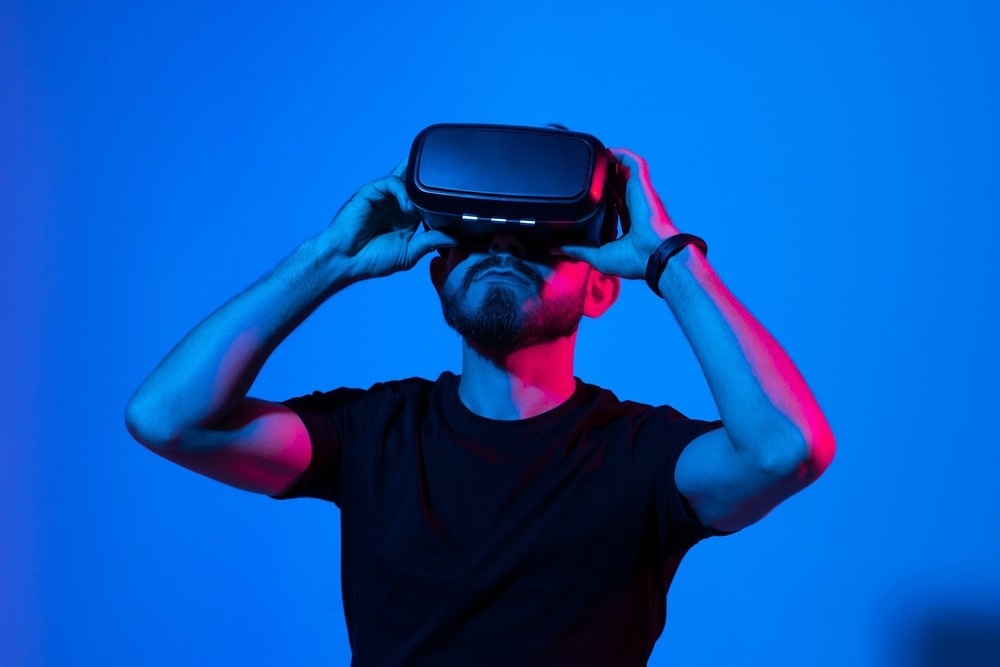Scientists from Seoul National University and Northwestern University in Illinois have published a new paper in the journal Nature Reviews Materials investigating the technological advances needed to fully realize the aims of the metaverse.

Study: Materials and devices for immersive virtual reality. Image Credit: Volodymyr_Shtun/Shutterstock.com
The paper reviews the current state-of-the-art perspectives on technologies, devices, materials, associated challenges, and the outlook for the development of a fully immersive metaverse. As technology matures, it has the potential to fundamentally change the way humans interact with each other in the virtual space.
What is the Metaverse?
The Internet has defined the 21st century, connecting people in a way previously thought impossible. Today, individuals can interact with each other socially, purchase goods and services, stay instantly informed of current news developments, and share ideas with people across the world who have an internet connection.
The metaverse is a conceptual evolution of the Internet. The origin of the term lies in science fiction literature in the early 1990s and is a portmanteau of “meta” and “universe”. Whereas current interactions on the Internet are performed through devices such as laptops and smartphones, the metaverse offers a more immersive experience for users by utilizing several virtual reality and augmented reality technologies.
The metaverse has potential applications in a plethora of industries, such as social media, healthcare, entertainment, the arts, gaming, virtual tourism, and employment training. Within the metaverse, individuals interact with virtual avatars of other users and virtual environments, which have endless design freedom.
Recent development has been spurred by several factors, and the metaverse is influenced by the Web 3.0 concept, which focuses on the decentralization of the Internet, token-based economics, and blockchain technologies. Most of the recent advances have been due to software advances, with hardware development comparatively slower.
Social factors such as the COVID-19 pandemic and individuals requiring the option of working from home and their preferences for virtual rather than physical interaction have played a role in increasing interest in the metaverse. Facebook’s recent rebranding as Meta has increased public awareness and demand for metaverse-adjacent technologies.
Technologies
Extended reality (XR) technologies are integral to the metaverse, including virtual reality, augmented reality, and mixed reality. XR technologies have already seen multiple applications in the past couple of decades, including telemedicine, virtual expeditions, product design, and media. XR devices recreate human senses and environmental sensations in the virtual world.
Materials science has a key role to play in hardware development, with the advent of smart materials driving the design and manufacture of functional wearable devices. XR devices include bodysuits, gloves, and headsets.
Sensation types define the type of information delivered to the user by these devices, with auditory and visual information provided by speakers and headset displays and haptic actuators delivering tactile information by exploiting electrical and mechanical mechanisms. Commercial headsets are a mature, successful technology, whereas commercial haptic device development is slower.
Haptic devices are still mainly limited to simple vibrations, but researchers are developing other feedback devices such as thermo-haptic devices. Developing fully integrated, efficient, and reliable haptic systems is an ongoing research topic in XR technology development.
Soft, smart materials such as stretchable materials and conductors, materials with variable stiffness, and soft actuators have been developed in recent years to improve the wearability of XR devices for use in the metaverse. Currently, many commercial metaverse-related hardware products are rigid and inflexible, limiting the comfort of wearers. Soft, functional, and smart devices provide opportunities for developers to improve the user experience dramatically.
Challenges
For the metaverse to become fully realized, key challenges with both software and hardware need to be addressed by researchers and companies. A richer and more immersive experience for users can be aided by the development of XR devices that accurately replicate all five human senses (touch, vision, hearing, taste, and smell.) Whilst vision, touch, and hearing replication is more mature, mimicking smell and taste is an extremely underdeveloped area of XR device design.
User comfort and device wearability is also a key area of research, with the development of technologies which are both wearable and functional key to the full commercialization of XR devices for the metaverse. Developing compact, unobtrusive components such as power supplies will improve comfort and wearability.
Another key challenge is the minimization of information mismatch by improving realism and reducing latency. Finally, there are ethical issues such as mental health, privacy, and data security that must be fully addressed by developers and companies in metaverse and XR research and development.
The Future
The world is witnessing a revolution in online connectivity, interaction, and commerce. The metaverse provides novel and innovative potentials for multiple industries, but fully realizing its potential requires developers to overcome technical and ethical challenges. Combining XR technologies with smart materials and advances such as soft robotics and digital twins offers solutions for industries such as biomedicine.
Further research will be needed to elucidate the fundamental relationship between users, XR technologies, and the metaverse. Another area of technological development that may provide a fully immersive experience free from external hardware is the direct integration of XR technologies with users through approaches such as brain implants, but this raises more ethical challenges.
More from AZoM: How Far Can Semiconductor Manufacturing Be Automated?
Further Reading
Pyun, K.R, Rogers, J.A & Ko, S.H (2022) Materials and devices for immersive virtual reality Nature Reviews Materials [online] nature.com. Available at: https://www.nature.com/articles/s41578-022-00501-5
Disclaimer: The views expressed here are those of the author expressed in their private capacity and do not necessarily represent the views of AZoM.com Limited T/A AZoNetwork the owner and operator of this website. This disclaimer forms part of the Terms and conditions of use of this website.